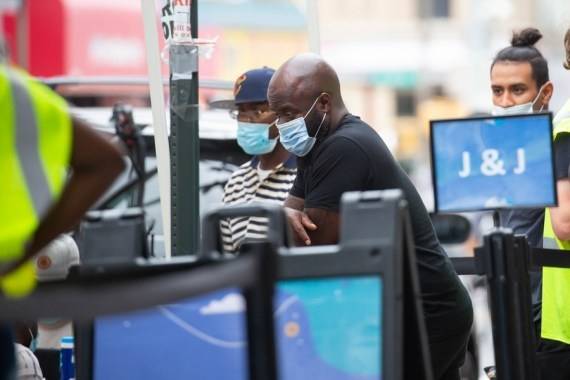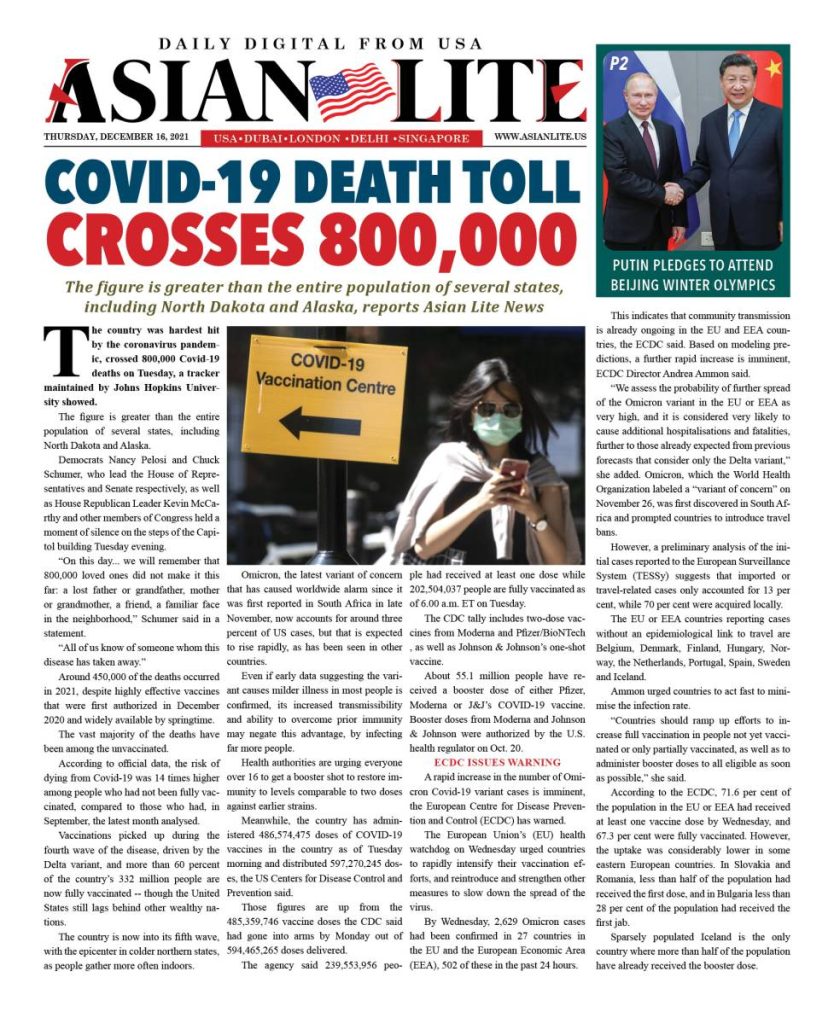The figure is greater than the entire population of several states, including North Dakota and Alaska, reports Asian Lite News
The country was hardest hit by the coronavirus pandemic, crossed 800,000 Covid-19 deaths on Tuesday, a tracker maintained by Johns Hopkins University showed.
The figure is greater than the entire population of several states, including North Dakota and Alaska.
Democrats Nancy Pelosi and Chuck Schumer, who lead the House of Representatives and Senate respectively, as well as House Republican Leader Kevin McCarthy and other members of Congress held a moment of silence on the steps of the Capitol building Tuesday evening.
“On this day… we will remember that 800,000 loved ones did not make it this far: a lost father or grandfather, mother or grandmother, a friend, a familiar face in the neighborhood,” Schumer said in a statement.
“All of us know of someone whom this disease has taken away.”

Around 450,000 of the deaths occurred in 2021, despite highly effective vaccines that were first authorized in December 2020 and widely available by springtime.
The vast majority of the deaths have been among the unvaccinated.
According to official data, the risk of dying from Covid-19 was 14 times higher among people who had not been fully vaccinated, compared to those who had, in September, the latest month analysed.
Vaccinations picked up during the fourth wave of the disease, driven by the Delta variant, and more than 60 percent of the country’s 332 million people are now fully vaccinated — though the United States still lags behind other wealthy nations.
The country is now into its fifth wave, with the epicenter in colder northern states, as people gather more often indoors.
Omicron, the latest variant of concern that has caused worldwide alarm since it was first reported in South Africa in late November, now accounts for around three percent of US cases, but that is expected to rise rapidly, as has been seen in other countries.
Even if early data suggesting the variant causes milder illness in most people is confirmed, its increased transmissibility and ability to overcome prior immunity may negate this advantage, by infecting far more people.
Health authorities are urging everyone over 16 to get a booster shot to restore immunity to levels comparable to two doses against earlier strains.
Meanwhile, the country has administered 486,574,475 doses of COVID-19 vaccines in the country as of Tuesday morning and distributed 597,270,245 doses, the US Centers for Disease Control and Prevention said.
Those figures are up from the 485,359,746 vaccine doses the CDC said had gone into arms by Monday out of 594,465,265 doses delivered.
The agency said 239,553,956 people had received at least one dose while 202,504,037 people are fully vaccinated as of 6.00 a.m. ET on Tuesday.
The CDC tally includes two-dose vaccines from Moderna and Pfizer/BioNTech , as well as Johnson & Johnson’s one-shot vaccine.
About 55.1 million people have received a booster dose of either Pfizer, Moderna or J&J’s COVID-19 vaccine. Booster doses from Moderna and Johnson & Johnson were authorized by the U.S. health regulator on Oct. 20.

ECDC issues warning
A rapid increase in the number of Omicron Covid-19 variant cases is imminent, the European Centre for Disease Prevention and Control (ECDC) has warned.
The European Union’s (EU) health watchdog on Wednesday urged countries to rapidly intensify their vaccination efforts, and reintroduce and strengthen other measures to slow down the spread of the virus.
By Wednesday, 2,629 Omicron cases had been confirmed in 27 countries in the EU and the European Economic Area (EEA), 502 of these in the past 24 hours.
This indicates that community transmission is already ongoing in the EU and EEA countries, the ECDC said. Based on modeling predictions, a further rapid increase is imminent, ECDC Director Andrea Ammon said.
“We assess the probability of further spread of the Omicron variant in the EU or EEA as very high, and it is considered very likely to cause additional hospitalisations and fatalities, further to those already expected from previous forecasts that consider only the Delta variant,” she added.
Omicron, which the World Health Organization labeled a “variant of concern” on November 26, was first discovered in South Africa and prompted countries to introduce travel bans.
However, a preliminary analysis of the initial cases reported to the European Surveillance System (TESSy) suggests that imported or travel-related cases only accounted for 13 per cent, while 70 per cent were acquired locally.

The EU or EEA countries reporting cases without an epidemiological link to travel are Belgium, Denmark, Finland, Hungary, Norway, the Netherlands, Portugal, Spain, Sweden and Iceland.
Ammon urged countries to act fast to minimise the infection rate.
“Countries should ramp up efforts to increase full vaccination in people not yet vaccinated or only partially vaccinated, as well as to administer booster doses to all eligible as soon as possible,” she said.
According to the ECDC, 71.6 per cent of the population in the EU or EEA had received at least one vaccine dose by Wednesday, and 67.3 per cent were fully vaccinated. However, the uptake was considerably lower in some eastern European countries. In Slovakia and Romania, less than half of the population had received the first dose, and in Bulgaria less than 28 per cent of the population had received the first jab.
Sparsely populated Iceland is the only country where more than half of the population have already received the booster dose.
“In the current situation, vaccination alone will not allow us to prevent the impact of the Omicron variant, because there will be no time to address the vaccination gaps that still exist,” Ammon warned.
She also urged countries to rapidly reintroduce and strengthen other measures to slow down the spread of the Omicron variant and keep the Covid-related burden manageable.
“It remains a priority to use face masks appropriately, telework, prevent crowding in public spaces, reduce crowding on public transport, stay home when ill, maintain hand and respiratory hygiene measures and ensure adequate ventilation in closed spaces. Countries may expect a strong resurgence of cases if they lift these interventions,” Ammon said.













